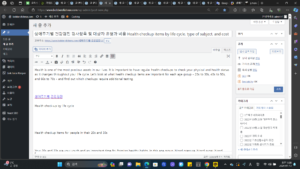Health is one of the most precious assets in our lives. It is important to have regular health checkups to check your physical and health status as it changes throughout your life cycle. Let’s look at what health checkup items are important for each age group – 20s to 30s, 40s to 50s, and 60s to 70s – and find out which checkups require additional testing.

Health check-up by life cycle
Health checkup items for people in their 20s and 30s
Your 20s and 30s are your youth and an important time for forming healthy habits. In this age group, blood pressure, blood sugar, blood lipids, and weight should be checked through general health checkups. Depending on your gender, you may also need cancer screening.
Health check-up by life cycle
▶ Body measurements: height, weight, body mass index (BMI), blood pressure, pulse, vision, hearing, etc.
▶ Blood tests: blood type, blood sugar measurement (diabetes test), liver function test, cholesterol, anemia test, etc.
▶ Urine test: general urine test, urine protein test, etc.
▶ Other tests: Chest X-ray for tuberculosis, oral examination, etc.
▶ Cancer screening according to gender: prostate cancer screening for men, cervical cancer and breast cancer screening for women
Starting in your 20s and 30s, you can check your health status through regular health checkups and protect your health in the future.
Health checkup items for people in their 40s and 50s
Health checkups in your 40s and 50s are important for early detection of chronic diseases and health problems that may occur as you enter middle age.
Health check-up by life cycle
▶ General health check-up items
▶ Chest CT: Early detection of lung cancer
▶ Gastroscopy: Early detection of stomach cancer
▶ Colonoscopy: polyp removal and early detection of colon cancer
▶ Bone density test: Early detection of osteoporosis
▶ Various cancer prevention tests: breast cancer, cervical cancer screening
▶ Cardiovascular disease management: electrocardiogram, echocardiogram, arteriosclerosis test
The risk of chronic diseases increases in middle age. This age group should pay attention to cancer screenings such as stomach cancer, colon cancer, and breast cancer, as well as osteoporosis screening and various cancer prevention tests.
Health checkup items for people in their 60s and 70s
People in their 60s and 70s are exposed to various diseases due to aging, so it is even more important to get tested to manage chronic diseases and maintain a healthy state.
Health check-up by life cycle
Health check-up by life cycle
Health check-up by life cycle
▶ Includes previous inspection items
▶ Brain CT: Early detection of stroke
▶ Cardiovascular disease management: electrocardiogram, echocardiogram, arteriosclerosis test
▶ Osteoporosis screening
▶ Dementia test
As people age in their 60s and 70s, managing cardiovascular disease, diabetes, high blood pressure, and osteoporosis becomes more important. In this age group, bone care, regular checkups for eyes, ears, and teeth are also things to pay attention to.
Additional check-up items in addition to health check-ups for each life cycle
In addition to basic health checkups based on age, additional tests may be required depending on individual needs, family history, lifestyle habits, etc. I also perform a thyroid function test, which is an additional check-up every year. If you have diabetes or high blood pressure in your family, I recommend taking it at the time of your health checkup.
▶ Thyroid function test
Thyroid function tests measure thyroid hormone levels to check for dysfunction. It mainly checks the levels of TSH (thyroid-stimulating hormone) and the thyroid hormones T3 and T4. Abnormalities in thyroid hormones can cause weight changes, fatigue, heart problems, and many other symptoms.
▶ High blood pressure test
Hypertension, a condition in which blood pressure is outside the normal range, is one of the major risk factors for heart disease, stroke, kidney failure, and other cardiovascular diseases. If your blood pressure exceeds 120/80 mmHg, it is called high blood pressure.
▶ Diabetes test
Diabetes testing measures blood sugar levels to diagnose or manage diabetes. It mainly checks the level of glucose (blood sugar) in the blood. Diabetes is a chronic disease characterized by abnormal blood sugar control. High blood sugar levels can cause damage to the kidneys, eyes, heart, blood vessels and nerves.
▶ Hyperlipidemia test
Hyperlipidemia tests measure cholesterol and triglyceride levels in the blood. Cholesterol is one of the risk factors for cardiovascular disease. It is important to develop healthy eating and exercise habits.
▶ Obesity test
Obesity testing uses body mass index (BMI) to determine whether you are obese. BMI is calculated from weight and height. A BMI of 30 or more is considered obese. Obesity increases various risks such as cardiovascular disease, diabetes, high blood pressure, and joint disease, so weight management is an important task.
In addition to health check-ups for each life cycle, it is important to undergo additional check-ups tailored to your situation. Health checkups that can detect and prevent diseases early are one of the keys to living healthier and longer lives. It is important to consult with a specialist and receive regular health checkups, taking into account your individual health status and family history. So, take the first step to protecting your health.